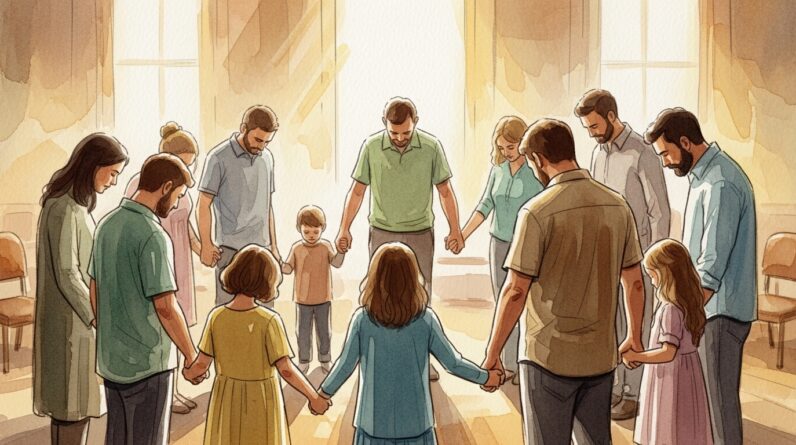Handling Conflict God’s Way: Biblical Steps Toward Reconciliation
Conflict is inevitable. Wherever people live, work, and worship together, misunderstandings and hurts will come. But as a follower of Christ, you’re called to handle disagreements differently—rooted not in human intuition alone but in the wisdom of Scripture. This guide shows you practical, spiritual, and actionable steps for biblical conflict resolution, inspired by Matthew 18:15–17 and Romans 12:18. You’ll learn how to prepare your heart, approach others, pursue reconciliation, and know when to involve the wider faith community, all while keeping Christlike humility and love at the center.
Why biblical conflict resolution matters
You may be tempted to brush conflict aside, but unresolved tension can erode relationships, church unity, and your personal witness. When you apply biblical conflict resolution, you honor God by seeking peace, protecting the testimony of the church, and reflecting Christ’s reconciling work. The Bible calls you to pursue peace actively and to aim for restoration rather than winning arguments or scoring moral points. That posture changes how conflict is handled and increases the chances of real reconciliation.
The two core passages: Matthew 18:15–17 and Romans 12:18
Jesus gives you clear steps for addressing sin or offense between believers in Matthew 18:15–17. Read the passage and keep it in mind as your primary roadmap for interpersonal conflict. See the passage here: Matthew 18:15-17. Alongside that, Paul gives you the heart posture for peacemaking in Romans 12:18: “If it is possible, as far as it depends on you, live at peace with everyone.” See the passage here: Romans 12:18. Together, these texts teach both practical steps and the attitude you need.
Start with prayer and self-examination
Before you say a word, take your concerns to God. Pray for wisdom, humility, and a soft heart. Ask God to reveal any contribution you made to the problem and to help you see the other person through Christ’s eyes. Scripture repeatedly invites self-examination as a precursor to confronting others. For instance, Matthew 7:3–5 urges you to take the plank out of your own eye before pointing out someone else’s speck. You can read Jesus’ words here: Matthew 7:3-5. This step helps you approach the situation honestly and reduces the chance that ego, defensiveness, or unresolved anger will worsen the conflict.
Make repentance and restoration your goal
When you prepare, keep in mind that the goal is restoration, not revenge. God’s heart is to reconcile sinners to Himself and to one another. Romans 12:18 provides a guiding posture: aim for peace as far as it depends on you. See the verse here: Romans 12:18. Restoration often requires both truth and grace—speaking honestly about the harm and offering forgiveness when the offender repents. Your aim should be to heal relationships and honor God, not to prove you were right.
Practice self-control and readiness to listen
You’ll likely feel emotions when you’re hurt, but Scripture repeatedly calls you to restraint. James 1:19 instructs you: be quick to listen, slow to speak, and slow to become angry. Read it here: James 1:19. When you keep a listening posture, you allow the other person to explain, and you avoid escalating the conflict. Gentle words can de-escalate tense moments; Proverbs 15:1 reminds you that “a gentle answer turns away wrath.” See it here: Proverbs 15:1. Listening well also positions you to understand motives and find common ground.
Step 1 — Go to the person privately (Matthew 18:15)
When someone sins against you, Jesus’ first step is very personal: go to them privately and talk it out. This is the essence of biblical conflict resolution: a direct, respectful approach between those involved. Read Jesus’ instruction here: Matthew 18:15. Private conversation protects reputations, reduces gossip, and makes reconciliation more possible. Before you approach them, plan what you’ll say. Use “I” statements—describe your feelings and the impact the action had on you, rather than accusing or labeling the other person. This keeps the conversation focused on restoration rather than generating defensiveness.
How to structure that private conversation
In the private meeting, begin with prayer or a calm statement of intent so the other person knows your desire is reconciliation. Briefly explain the issue from your perspective using specific facts, not general accusations. Give the other person space to respond. If the other person’s memory differs, listen carefully and ask clarifying questions. If they admit fault, offer forgiveness, and seek practical steps for making things right. If they deny wrongdoing, ask if they’re willing to continue the conversation later or to hear a mutual friend’s perspective. Keep your tone humble and your language clear.
Step 2 — Involve one or two others if needed (Matthew 18:16)
If the private conversation doesn’t lead to reconciliation, Jesus says to bring one or two others along as witnesses and mediators. Read the instruction here: Matthew 18:16. These witnesses should be impartial, mature believers who can listen fairly and help restore the relationship. The idea isn’t to gang up on the other person, but to create a safe, objective context where truth can be weighed and reconciliation can be facilitated. Choose individuals who are known for discretion, wisdom, and a heart for restoration.
What kind of witnesses are and what they should do
Choose witnesses who will listen to both sides and who can testify to what was said. They should help de-escalate rather than inflame the issue, ask clarifying questions, and provide godly counsel. Their role is to discern and support reconciliation: they might suggest practical steps for repair, propose a timeline for apologies, or mediate the exchange. Galatians 6:1 also gives a tone for this step: restore someone who is caught in a fault gently, watching yourself so you aren’t tempted. Read it here: Galatians 6:1.
Step 3 — Take it to the church when necessary (Matthew 18:17)
If the person still refuses to listen after private attempts and witness involvement, Jesus instructs you to bring the matter before the church. See the verse here: Matthew 18:17. This final community step is not punitive in the first instance; it’s meant to shepherd the person back into right relationships and to preserve the spiritual health of the congregation. The church’s role is pastoral: to confront with love, offer counsel, and, if necessary, apply redemptive consequences to protect the community and encourage repentance.
What “bringing it to the church” looks like in practice
How this looks will vary by church polity. In some congregations, it’s a scheduled meeting with elders or a pastoral team. In others, it may involve a formal process with a small committee. The aim should always be restoration and clarity. The church should document attempts at reconciliation, ensure fairness, and provide clear steps for repentance and restoration. Keep in mind that church discipline is meant to be restorative, not punitive: even if eventual temporary separation occurs, the hope should be reconciliation and return.
Pursue peace proactively (Romans 12:18)
You won’t always control the other person’s response, but you do control your effort toward peace. Romans 12:18 calls you to live at peace with others as far as it depends on you. See it here: Romans 12:18. This means you should be the first to reach out, to seek mediation, and to accept reasonable apologies. Where possible, choose the route that leads to harmony while not compromising truth. Peace pursued in humility and truth mirrors God’s reconciling work in Christ.

Forgiveness: when and how to grant it (Colossians 3:13; Matthew 18:21–22)
Forgiveness is central to reconciliation, but it isn’t always automatic or simplistic. You’re called to forgive as the Lord forgave you, which means you should be ready to release a debt when genuine repentance occurs. See Colossians 3:13 here: Colossians 3:13. Jesus also pushes the limit of forgiveness when Peter asks how many times to forgive; the answer points you to unlimited mercy. See Matthew 18:21–22 here: Matthew 18:21-22. Forgiveness doesn’t mean you ignore consequences or allow abuse; it means you let go of the debt in your heart and seek restoration that honors both truth and safety.
Hold healthy boundaries while offering grace
Offering forgiveness doesn’t require you to be vulnerable to further harm. If an offense shows a pattern of abuse or manipulation, you must protect yourself and others even as you forgive. Scripture recognizes the need for wisdom alongside grace. For instance, Romans 12:17–21 instructs you not to repay evil for evil and to overcome evil with good, but it does not suggest putting yourself back into harm’s way. See the passage here: Romans 12:17-21. Establish clear boundaries for contact, accountability, or consequences as part of a wise, compassionate restoration plan.
Apologizing well: confession and repentance (James 5:16; 1 John 1:9)
If you’re the one who sinned, you’ll need to apologize with clarity and humility. Confession is more than saying “I’m sorry”—it involves admitting specific wrongs, expressing regret for the hurt caused, and committing to change. James encourages you to confess your sins to one another and pray for each other. See James 5:16 here: James 5:16. 1 John 1:9 promises God’s faithfulness to forgive when you confess to Him: 1 John 1:9. A genuine apology invites the wounded person into a process of trust-building and practical restitution where needed.
Use wise communication techniques
Your words matter. Ephesians 4:29 directs you to speak only what builds others up and is helpful for their needs, so your speech can benefit those who listen. Read it here: Ephesians 4:29. Avoid loaded phrases, generalizations, and absolutes. Replace blame with your experience, and ask open questions that encourage dialogue. If emotions run high, consider pausing and agreeing on a time to resume. This keeps the conversation productive and prevents escalation.
Avoid gossip and slander
When conflict arises, it’s tempting to vent to others, but gossip damages reputations and multiplies wounds. Scripture warns against tale-bearing and slander because they multiply division. Instead of sharing the painful details publicly, follow the Matthew 18 model of direct, private engagement. If you need counsel, go to one or two trusted believers who will maintain confidentiality and help you pursue restoration. Proverbs 20:19 and Ephesians 4:29 both highlight the danger of careless speech; protect the integrity of the process by keeping the matter as contained and constructive as possible. See Proverbs 20:19 here: Proverbs 20:19.
Dealing with repeated offenses or unrepentant people
Sometimes, despite your best efforts, someone refuses to repent or continues in harmful behavior. In those cases, you may need to step back and let the community implement appropriate measures. If someone persists in sin and refuses to repent, Jesus’ Matthew 18 flow leads to treating them “as a pagan or a tax collector.” Read the full context here: Matthew 18:17. This can mean limiting fellowship until there is change, while keeping an open door for restoration. In serious cases involving abuse or criminal behavior, you should also involve appropriate civil authorities for protection and justice.
Reconciliation is a process, not a single event
Remember that reconciliation often takes time. Even when verbal apologies occur, trust must be rebuilt through consistent behavior over time. Restoration may require ongoing accountability, counseling, or adjusted patterns of interaction. Hebrews 12:14 encourages you to make every effort to live at peace with others and to pursue holiness, which shows that perseverance and intentionality are part of the process. See it here: Hebrews 12:14.
When to seek mediation or professional help
There are occasions when conflict is complex or emotionally charged enough that you should involve trained mediators or Christian counselors. Mediation can help when communication patterns are entrenched or when both parties need a neutral facilitator to guide the process. Seek out someone with experience in biblical counseling or conflict resolution, and make sure they adhere to Scriptural convictions. Proverbs 11:14 highlights the value of multiple counselors in finding wisdom: Proverbs 11:14. Professional help is not a defeat; it’s often the wise step that prevents deeper harm and helps both parties move toward reconciliation.
Special situations: marital and family conflict
Conflicts within marriages and families are especially painful because of the deep emotional bonds involved. The Bible consistently calls you to love sacrificially, seek peace, and pursue unity within the family. If you’re in a marital conflict, consider Ephesians 4’s call to patience, gentleness, and forbearance, and Ephesians 5’s call to mutual love and respect. See Ephesians 4:2 here: Ephesians 4:2. Bring trusted counsel, and be willing to seek professional Christian marriage counseling if needed. Protect children from being enlisted as messengers or referees, and model healthy conflict-handling for them.
Conflict in the workplace or public ministry
When conflicts happen outside the church—at work or in public ministry—you still have the responsibility to act biblically. Romans 12:17–21 is especially relevant: don’t repay evil with evil; live peaceably, yet stand for truth. See it here: Romans 12:17-21. Follow organizational procedures where appropriate, and still attempt personal reconciliation if possible. Protect your witness by keeping conversations professional, avoiding slander, and documenting interactions when necessary. If an employer or leader is abusive, consider whether it’s safe and wise to remain and seek counsel and prayerful guidance about the next steps.

The church’s role in reconciliation and discipline
The church exists to shepherd souls, restore the fallen, and preserve the community’s holiness. When disputes escalate to the congregation level, leaders must act with pastoral sensitivity and Scriptural fidelity. They should offer clear steps toward repentance, provide resources for restitution, and guard against injustice. The goal should always be to welcome the repentant back without humiliating them, and to ensure the safety and spiritual health of the congregation. Galatians 6:1’s call to restore gently applies strongly to leaders: restore with humility and care. See it here: Galatians 6:1.
Maintaining humility and dependence on God
Throughout conflict, remember your dependence on God for wisdom, humility, and strength. Pride tempts you to defend your reputation; fear tempts you to avoid confrontation. Rely on the Holy Spirit to guide your words and posture. Philippians 2:3–4 reminds you to consider others better than yourself and to look out for their interests. Read it here: Philippians 2:3-4. When you choose humility, you’re more likely to engage in biblical conflict resolution that leads to real, lasting reconciliation.
Practical daily habits that promote peace
You can reduce future conflicts by cultivating habits that build trust and minimize misunderstandings. Practice regular communication, clarify expectations, forgive quickly when appropriate, and develop accountability relationships. Pray for those you find difficult and ask God to change your heart. These small, daily practices build a culture of peacemaking and make it less likely that conflicts will escalate into lasting division.
Learning from failures and moving forward
You won’t handle every conflict perfectly. When you mess up, confess, make amends, and learn. God’s grace covers your failures, but repentance and correction are essential for growth. Use each conflict as an opportunity to grow in maturity, empathy, and skillful peacemaking. Ask God to teach you and to use even painful experiences to shape your character into the likeness of Christ.
Final encouragement: pursue reconciliation with courage
Biblical conflict resolution is demanding because it requires humility, courage, and patience. But it honors God and reflects the gospel when you pursue reconciliation faithfully. Remember Matthew 18’s practical steps—private conversation, witnesses, and church involvement—and let Romans 12:18 shape your heart for peace. See Matthew 18:15-17 again here: Matthew 18:15-17 and Romans 12:18 here: Romans 12:18. Trust God for wisdom, act with love, and be persistent in seeking reconciliation.
Explore More
For further reading and encouragement, check out these posts:
👉 7 Bible Verses About Faith in Hard Times
👉 Job’s Faith: What We Can Learn From His Trials
👉 How To Trust God When Everything Falls Apart
👉 Why God Allows Suffering – A Biblical Perspective
👉 Faith Over Fear: How To Stand Strong In Uncertain Seasons
👉 How To Encourage Someone Struggling With Their Faith
👉 5 Prayers for Strength When You’re Feeling Weak

📘 Jesus and the Woman Caught in Adultery – Grace and Mercy Over Judgement
A powerful retelling of John 8:1-11. This book brings to life the depth of forgiveness, mercy, and God’s unwavering love.
👉 Check it now on Amazon 🛒💥
🔥 “Every great message deserves a home online.” 🌍💬🏡
Don’t let your calling stay hidden. Start a Christian blog or website using Hostinger — with 99.9% uptime, a free domain, and SSL, your voice can shine for God’s glory anytime, anywhere.
💥 Begin today. 🛒 Try it RISK-FREE! ✅
✝️ “Your body is God’s temple — care for it with purpose.” 💪💖🏛️
Renew your energy and restore balance naturally. Mitolyn helps support a healthy metabolism, giving you the vitality to live out God’s calling with strength and confidence.
🔥 Unlock Your Metabolic Power! ⚡Burn More Calories & Feel Great With Mitolyn. 💪
👉 Start Today. 🚀 Check Price Now. 🛒💰
💰 As a ClickBank & Amazon Affiliate, I earn from qualifying purchases.
📖 Acknowledgment: All Bible verses referenced in this article were accessed via Bible Gateway (or Bible Hub).
🚀 Want to explore more? 👉 Dive into our new post on Why Jesus? and experience the 🔥 life-changing truth of the Gospel!





